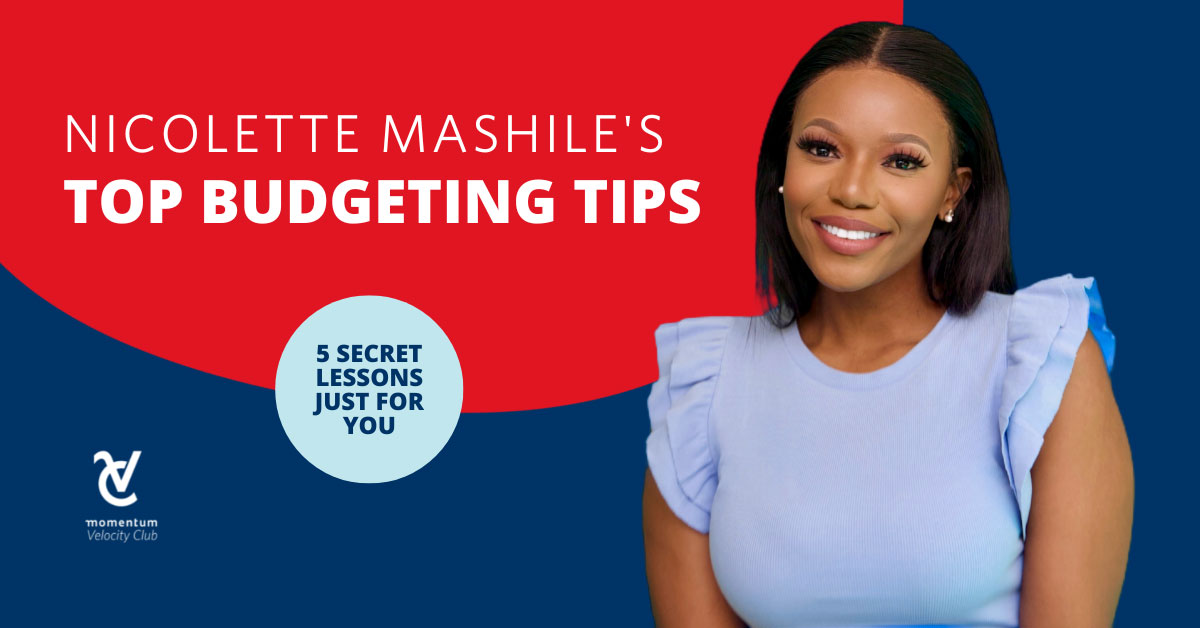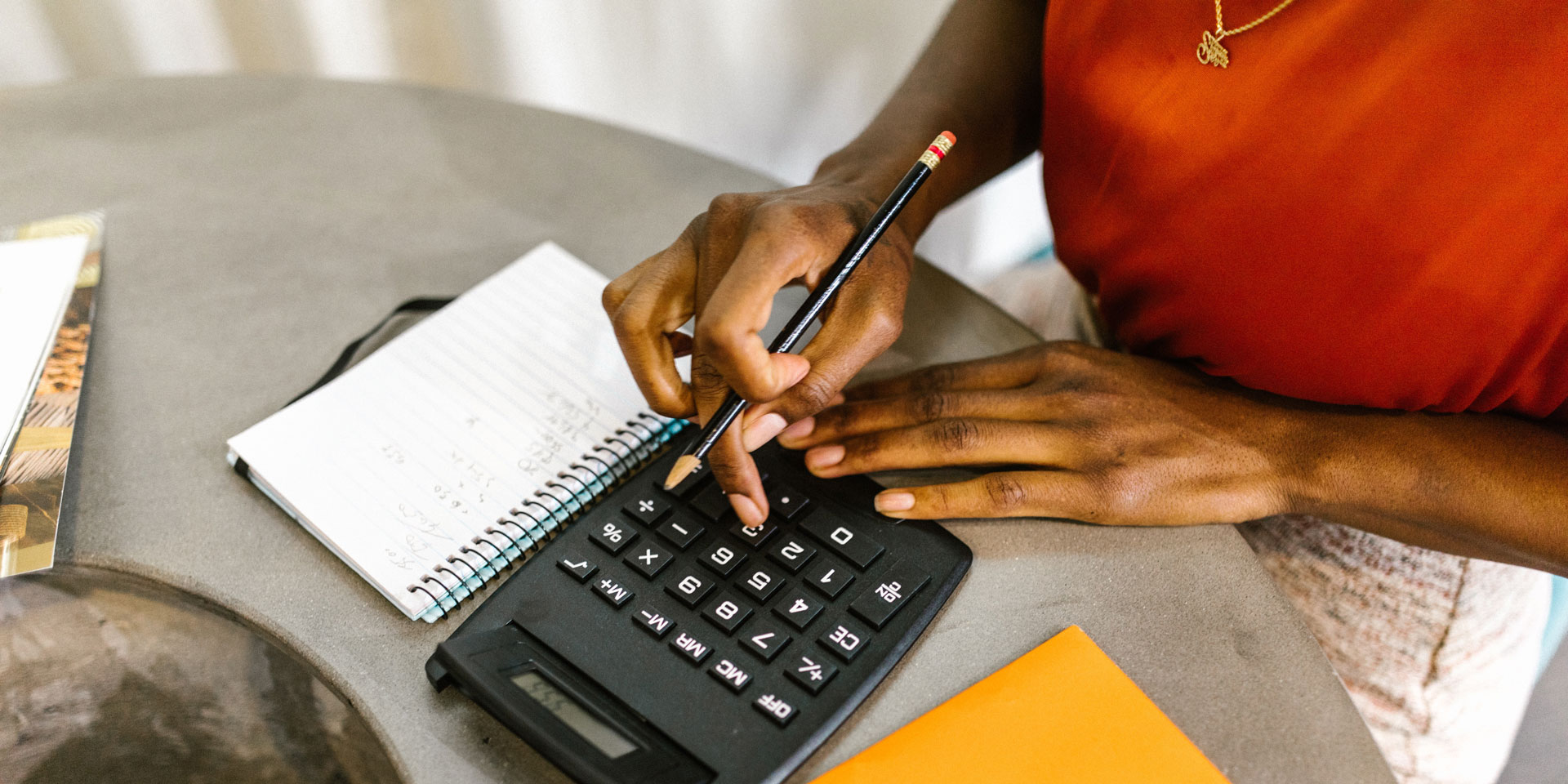25 October 2022 | 10 - 12 read
Nicolette Mashile’s 5 budgeting secrets

You all know that we love budgeting, and there’s a good reason for that: Being good at budgeting is the key to unlocking your financial goals and, ultimately, it’s the secret to building a solid financial future not only for yourself but for your family, too.
Once you control the basics of financial planning, you’ll be ready to start doing more with your money and build wealth.
Someone who knows all about budgeting and how to use budgets to take control of your finances like a boss is our well-known financial educator, the fabulous Nicolette Mashile, also known as Financial Bunny. We asked Nicolette to share with us her top 5 budgeting secrets.
1. Pay yourself first
Nicolette’s advice here is simple: Set up a stop order or an automated scheduled payment into a savings or investment account.
This needs to be the very first line item on your budget. That ensures that the money you’re saving or investing is immediately set aside from any risk of being spent on other things.
The great benefit of saving and investing is that it helps you to build financial discipline, and financial discipline opens the door for you to achieve important financial things in future.

2. Budget with your statement
When you log into your banking App or website or open your monthly bank statement, you can view your transaction history for a given period. This shows everything you’ve spent money on for the month and all of the income you received.
Your transaction history for the past month or two will give you a clear idea of how you spend your money and what everything costs you each month. Use that information to help you ‘project’ how to allocate your money to various areas or expenses. By ‘project’, we mean taking that information and using it to plan for those expenses in future. Use our budgeting template to help you get started. Just copy the sheet, save it and use it!
At the end of the month, you can use that month’s bank statement to check how your budget measured up against the actual costs you incurred and the things you spent money on. If need be, you’ll be able to adjust your budget here.

3. Weekly and monthly budgets
According to Nicolette, the best way to plan your monthly budget is to divide it into monthly and weekly expenses.
Your monthly expenses would be those repeat costs that are stable and predictable, such as your bond or rent payment, car repayment, insurance, cell phone contracts and similar items. These are primarily paid at the beginning of the month, making it even easier to manage them.
Nicolette suggests putting your living expenses into a weekly budget. This allows for much more control over a category that is typically the most challenging to manage.
“A weekly budget is for groceries and to give you a general view of your living expenses,” she commented. “The reality is that it’s difficult to decide what meals you’ll make in week 3 of the month, so rather avoid doing that because it just causes waste.”
Weekly budgeting also ensures regular oversight over your living expenses to see how things are changing or to allow for things like price increases. That leads us to Nicolette’s next budgeting secret.

4. Track your budget weekly & keep a budget diary
Although it sounds like a lot of work, tracking your budget weekly is the ultimate way to see where your money is going and whether any patterns are emerging. It puts you in control of your money.
“A budget diary is like a money journal, in which you track your spending patterns,” she said. “This lets you see when you are staying on track and your behaviour changes. This could be related to anything from the time of the month to anxiety episodes or even the route that you take home from work.”
For Nicolette, shopping at Woolworths is a particularly weak spot. “The days when I’m working on set are the days where I am guilty of a lot of frivolous spending. My route home passes a massive Woolworths, and I’m usually on autopilot on my way home from work. My excuse to go into Woolworths is always to buy dinner, but I often end up buying more than what I actually need,” she revealed. “Keeping a budget diary allows you to see your budget loopholes.”
5. Set up budget targets
Budget targets are your financial goals. An example of a financial goal could be paying off a particular debt or saving for something you want to buy.
Here’s where the power of your budget comes in. By having a clear view of your money, you’ll be able to take small amounts off each line item to pay for bigger goals like a big debt or to put into investments for your future.
Conclusion
Nicolette Mashile is all about managing your money like a boss, and today we brought you her 5 budgeting secrets to get you on the path towards achieving your financial goals.
Let’s recap:
- Pay yourself first by setting up a scheduled payment or stop order to deduct income into a dedicated savings or investment account.
- Draw up a budget using actual spending data from your bank statement.
- Separately budget your big, fixed monthly expenses from your daily and weekly living expenses.
- Actively track your expenditure daily and weekly to see if any particular habits or patterns emerge.
- Set up budget targets to help you achieve those long-term financial goals.
Follow these steps to get on top of your budget, and you’ll soon realise how much better you feel about your money. Once you understand where your money goes and what you want to achieve, your future plans become clearer.
If you’re already on top of your budget and have surplus funds and room to manoeuvre, and you’d like to take your money management to the next level, book a consult with one of our financial experts - we can help you grow your wealth.

19 SEPTEMBER 2022 | 10 - 12 read
The importance of having a Will - and what happens if you don’t

31 AUGUST 2022 | 8 - 10 read
5 financial tips to get you ready for summer!

29 JULY 2022 | 8 - 10 read
Women's Month special: How to take control of your finances like a boss

SIGN ME UP
Start making the right money moves today
Put your goals within reach. Leave your details and a Relationship Consultant will call you back.
